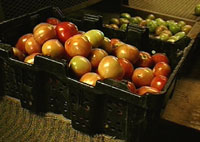USDA Meeting Shows Potential for Kentucky Small Farm-to-School Produce Sales
USDA Meeting Shows Potential for Kentucky Small Farm-to-School Produce Sales

Small farmers in states like North Carolina and Florida are taking advantage of the Department of Defense's food procurement system to sell and deliver fresh produce to local schools.
That was just one of the eye-opening messages that came out of Kentucky's first Small Farm-to-School Meals Initiative meeting held in Georgetown in early May.
The meeting was inspired by a new national USDA initiative that recognizes the importance of small farms and is attempting to build on their strengths and equip them to successfully compete.
The Kentucky meeting attracted a crowd of over 250 farmers, school food service administrators, representatives from various federal and state agencies, and experts from the University of Kentucky College of Agriculture and Kentucky State University.
In the wake of a major drought that hurt many Kentucky farm operations in 1999 and shrinking tobacco quotas, there was a special sense of urgency at the Kentucky meeting.
Participants had an opportunity to hear all the major state and federal agencies that could provide the expertise and, in some cases, some start-up research, marketing and funding to get the process started.
The types of success stories that were highlighted at the meeting were as diverse as their locations.
In North Carolina, a large coalition of small farmers and school systems learned how to tap into the Department of the Defense's food procurement system to buy and transport fresh produce to schools throughout the state.
The participants heard how a small group of Ohio farmers learned to negotiate with the food service director of Ohio University at Athens to supply that large institution with locally grown products.
Another report described how a group of small-acreage minority farmers in North Florida took advantage of federal and local expertise and the DOD procurement and delivery system. They learned how to create a Cooperative that now supplies products like collards, strawberries, blackberries and turnip greens to the Gladsen County School district which serves an average of more than 10,000 meals per day.
Closer to home, Scott County Extension agent Mark Reese explained that their local farmer's cooperative learned how to market to local schools and institutions and has now expanded their efforts to supply a large grocery chain. He added that they now have the happy problem of trying to find more space to increase their production and processing capacity.
The meeting also emphasized that Kentucky producers who intend to find new markets must take into account much more than how to grow a new crop.
Dealing with federal and state food safety regulations, making the right contacts with institutional buyers, and meeting specific harvest dates are just a few of the day-to-day issues that producers will have to address beyond the production requirements of the crops being raised.
Although forming a Cooperative can include many hurdles, many of the guest experts urged producers to consider this type of coalition because of a Cooperative's ability to obtain adequate funding for start-up costs or to increase capacity to supply a large client.
The seeds of progress have begun to sprout from Kentucky's first Small Farms-to- School Meals Initiative meeting.
"The general feeling from the vast majority of parties at the meeting was that we should go for it and try to make it fit in our state," said Alice Baesler, principle assistant with the Kentucky Department of Agriculture.
The meeting generated three different direct marketing arrangements between small groups of producers and school food system administrators in Fayette and Franklin Counties and one Western Kentucky county yet to be named.
Baesler point out that the experiences shared by these Kentucky producers and school food directors should help to clarify the path for other future local market arrangements.
And the discussions will continue. The Commodity Growers Cooperative has offered to sponsor the next Kentucky meeting.
"We don't see anything but good opportunities coming out of this initial meeting," said Pam Sigler, Extension associate specialist in Family and Consumer Sciences in the UK College of Agriculture. "We found out that we are on common ground and the meeting helped point out the challenges we need to address to make things work."